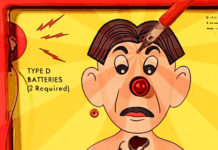The Eight Lessons of Suicide
Losing a loved one to suicide hurts like hell: there’s an obvious truth if there ever was one. But there are other truths, some hard, some hopeful. If you’ve suffered such a loss yourself, you know too much of these truths already.
Changing Society’s Whole Approach to ‘Psychosis’
Fifteen years ago this month we were sitting together in the basement of Peter’s house. We had felt a sense of despair at the widespread misinformation and atrocious stereotypes that were dominating media coverage of mental health at the time. We felt that our profession had a responsibility to challenge these stereotypes, and that as psychologists we had something unique to contribute. That was the time when research into the psychology of psychosis was beginning to burgeon, and many of our findings challenged not only the stereotypes but – perhaps more significantly - much ‘accepted wisdom’ within mental health services as well.
What Role Does Talk Therapy Have in Recovery from Psychosis?
In my graduate education, we were taught how to deal with a wide variety of human troubles — but one big exception was psychosis! For that, we were told to send our clients to the psychiatrist.
Reflections on a Psychiatric Indoctrination, or, How I Began to Free Myself from the...
(dictionary.com)
Cult, n.
a particular system of religious worship, especially with reference to its rites and ceremonies.
an instance of great veneration of a person, ideal, or...
Some Thoughts About Conferences
Without judging the motivation of people presenting and speaking at conferences, I’d like to ask the question: can we achieve more with these conferences than generating knowledge and touching people's hearts? Are we preparing the ground for change or are we marking time?
Does Anyone Want a Genetically Modified Brain? – Anti-Psychotic Medications May Have Been Causing...
Move over outdated chemical imbalance theory, now it is claimed that genetic misregulation underlies psychiatric disease, and that psychiatric drugs themselves can fix the genetic...
Intensive Home Treatment for Acute Mental Disorders: An Alternative to Hospitalization
Unlike hospital treatment, IHT is attentive to family issues and helping negotiate re-entry into work or school. It is also consistent with the recovery principle of least intrusive interventions.
Mental Health Survival Kit, Chapter 2: Is Psychiatry Evidence Based? (Part 1)
Psychiatric diagnoses are not built on science but are consensus-type exercises where it is decided by a show of hands which symptoms should be included in a diagnostic test.
Mickey Nardo: Tangled up in Life
Mickey Nardo died yesterday. Here is a brief account of his career, chiseled out of him for the Restoring Study 329 site. What strikes me most is his interest in the tangles people end up in. This certainly is a theme that ran through his blog.
Bad Science Revisited: “The Bell Curve” Turns 30
Critiquing the wildly popular 1994 eugenicist book, which purported to link IQ and race, by reviewing the supposed genetic evidence.
Did Electroshock Save my Life?
In July 2006, I wrote about Electroconvulsive Therapy and stated, “If I had the opportunity to have another series of treatments I would do...
Waking Up to Your Emotions 101: The Other Side of Psychiatric Drug Withdrawal
Many people find themselves stuck: withdrawal symptoms might have passed, but emotionally, life feels overwhelming.
Love It, Hate It … Write Your Own Review of the DSM-5 on Amazon
Greetings, MIA readers. Would you like to write your own review of the DSM-5 (even if you haven’t read it, never mind bought it.) I’ve done neither, but I’ve read, talked, written enough about it to have an opinion. Write your own review of the DSM-5 on Amazon …Here's the link
The Two Earliest Stories of Recovery in Oregon
In the early 19th century, frontiersmen Pelton and Day experienced recovery from "mental illness" after traumatic experiences.
Psychiatric Survivor Entrepreneurs
Many psychiatric survivors have created a gift economy of sorts in offering peer support, and this is by no means to criticize those offering their best guidance freely to those who desperately need it. In fact, the gift economy saved my life when it was threatened by psychiatric drugs. Yet, my entrepreneurial spirit, as chaotic and unsophisticated as it has been at times, has played a huge role in saving me from being a chronic mental patient with a chronic identity of “sick” or “failure” or “other”.
Social Determinants of Health and the Continued Individualization of Suffering
We need to stop believing that suffering people are genetically inferior or “diseased.” You, as sufferer, are not alone in having social determinants of health. They are universal. They are systemic. And they are not solvable or “addressable” at the individual level. The only way to alleviate negative social determinants of health is to create a more equitable, inclusive, and just society.
A Liberation Journey with Images
I am humbled to share with you my life’s journey, and more importantly to convey a recent experience that has transmuted everything, opening up a new frontier of being more fully alive. I am beginning to see the invisible; or should I say I am beginning to feel it, because it is an inner experience.
Dear Boston Globe, Part IV: A Taste of Your Own Medicine
The Boston Globe paints a picture (in the vivid way that they so love to do) that pins the system’s decline primarily on budgetary issues, but there is more than one way for a system to be ‘broken.’ In fact, where the Globe goes most wrong in their latest piece, ‘Community Care,’ is in their failure to adequately recognize that the system has always been broken in one way or another in this country.
Dr. Friedman Criticizes the Overuse of the Atypical Antipsychotics
Just being “safe and effective” is not a strong endorsement, and it lacks any justification for the exorbitant amounts of money that have been paid for these medications. Their commercial success was due to the fact that they were advertised as “better” not just safe. Texas and 36 other states have now realize that they were misled about second-generation antipsychotics being better, and they are recouping their money.
The Green Shadow Cabinet and a Mental Health Declaration of Independence
Americans have increasingly lost community and autonomy, and have acquired instead the tyranny of institutionalization: domination by gigantic, impersonal, bureaucratic, standardized entities — visible in large corporations, the workplace, health care, schools, and much of our lives. This institutionalization has made many Americans feel small, isolated, helpless, scared, inattentive, bored, angry, alienated, and depressed.
A History of Anglo-American Psychiatry
It comes as something of a shock to realize that I have been researching and writing about the history of Anglo-American psychiatry for more than forty years now. It scarcely seems possible that more than three decades have passed since I first begun burrowing around in the archives of those Victorian museums of madness that in the early 1970s were still the all-too-concrete legacy of the enthusiasms of an earlier generation - those warehouses of the unwanted whose distinctive buildings for so long haunted the countryside and provided mute testimony to the emergence of segregative responses to the management of the mad.
The Unmedicated Life
It has been 7.5 years since I got off benzos, the drug that damaged me the most, and 6.75 years off all meds; the final medicine I tapered was a tricyclic antidepressant, nortriptyline, in autumn 2006. Since that time, I have not taken another psychoactive medicine, nor have I had any desire to. Neither have I sought out therapy or the like. Personally, I’m sick of labels, sick of the industry, sick of talking about my “problems,” sick of navel-gazing, and would just rather live.
Deep Brain Stimulation and Deeply Biased Researchers, Revisited
In the Washington Post last week, a new treatment was being advanced as a breakthrough for opioid addiction. What was this miraculous new intervention? Implanting electrodes deep in the brain, and using a battery implanted elsewhere in the body to zap the addict and keep him from relapsing.
End Kendra’s Law Now: Racist, Classist Practices in Involuntary Psychiatry Persist
In addition to involuntary outpatient commitment being an assault on and targeting people who are living in or near poverty, the statistics demonstrate racial disparities in the application of involuntary outpatient commitment.
Mad in Italy
Mad in Italy's main focus is research, publishing articles on failures of the disease model and the effectiveness of alternate, humanistic approaches. The goal is policy change; the means is data.





















